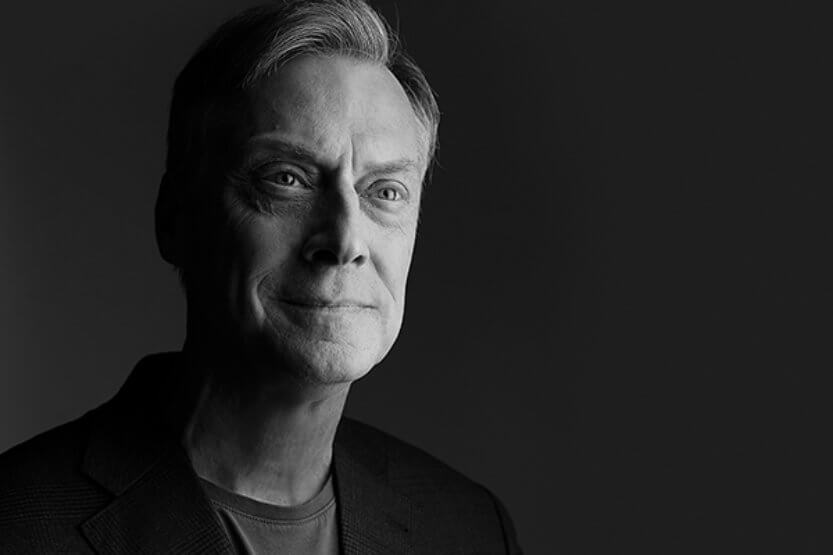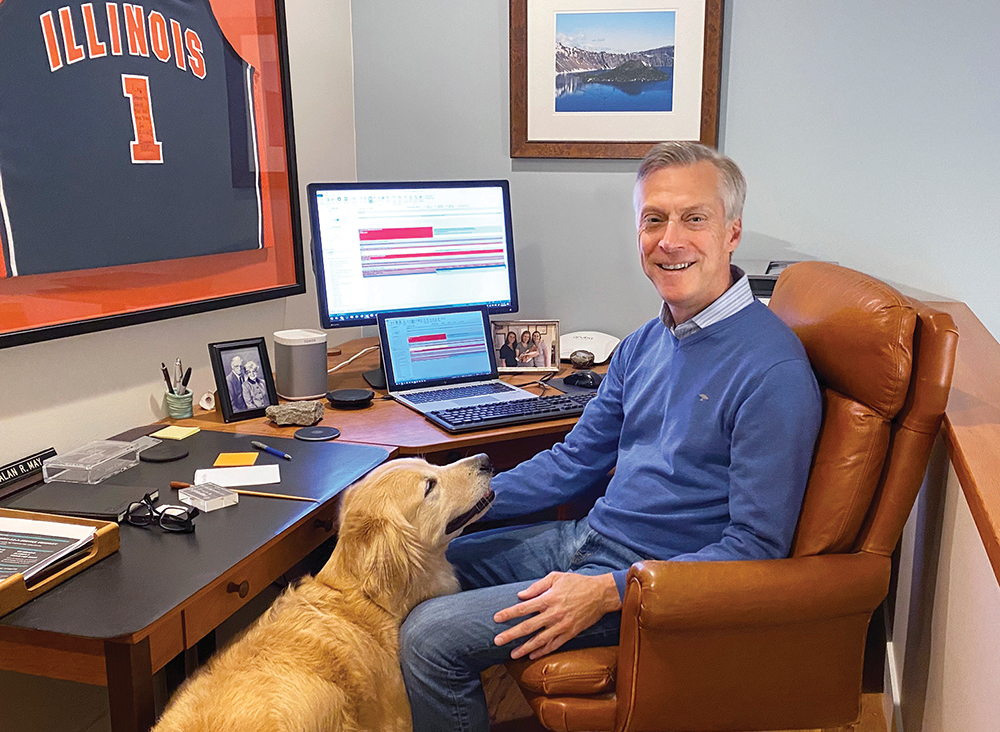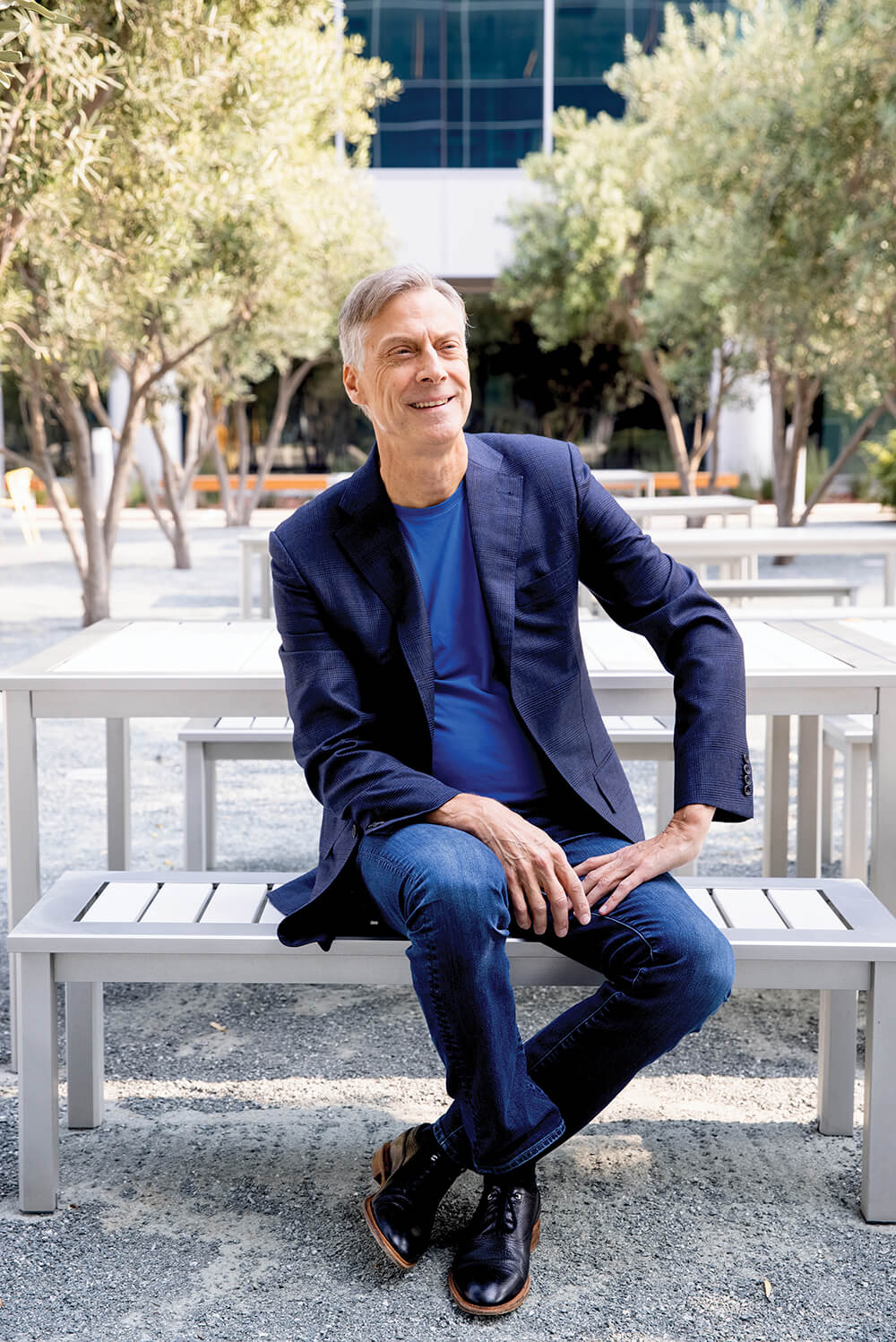Challenged
 Alan May (Image by Smeeta Mahanti)
Alan May (Image by Smeeta Mahanti) Alan May ’80 LAS, MS ’82 LER, was on vacation when he heard about the coronavirus. It was early January 2020, and he was in a hotel room in Marrakesh, Morocco, drinking mint tea and catching up on the news. An item in the Financial Times caught his eye: something about a mystery virus in Wuhan, China.
He read with mounting unease. May, 62, is the executive vice president of human resources at Hewlett Packard Enterprise and responsible for the welfare of the technology company’s more than 60,000 employees worldwide—including some based in Wuhan. What if things got out of control? At that point, though, it was just a vague worry.
Within a few weeks, COVID-19 began its grim march across the globe. Wuhan locked down, then Milan, Madrid and London, England. As one HPE office after another shuttered, May’s crisis team scrambled to make sure employees were safe. By March, the virus had arrived at May’s doorstep in the San Francisco Bay Area, home to HPE’s headquarters. May, speaking via Skype from his home on the West Coast, breaks off the story. He sighs and adjusts his glasses—a backup pair, black and chunky and inadvertently hip. Then he says, “I’ve been living the pandemic, if you will, from the very earliest stages.”
When people hear “human resources,” they often think of Toby, the sad-sack bureaucrat from The Office. Not so, according to May. “It’s not simply about a job,” he says. “It’s about: ‘How can you satisfy people’s ambitions in life more broadly?’” He notes that we spend more time working than doing anything else in our lives; ideally, that work should serve something deeper in us. “I’ve always felt that the higher calling of human resources is to make sure individuals have the opportunity to make the most of that time, to grow and develop.”
Human resources has always been a tough job. It’s even tougher now that COVID-19 is rewriting the rules of the American workplace, forcing indefinite work-from-home requirements, spotlighting longstanding racial and gender inequities, and prompting new questions about how offices should be run. Over his nearly 40-year career, May has seen and done it all, for companies large and small, traditional and progressive, through peaceful times and bitter, drawn-out strikes. No matter the situation, he aims to balance the needs of all parties—employees, managers, shareholders and the surrounding community. Denis Simon, a senior vice president with the executive outplacement firm Challenger, Gray & Christmas, has known May for 20 years. He calls him “arguably the most astute and admired HR executive in the country today.” May is drawing on all of that expertise to help steer HPE toward whatever comes next.
Prefers face-to-face interaction
May grew up in Toledo, Ohio, the youngest of three siblings, playing baseball, basketball and the trumpet. His working life began early: At 11 years old, he had a paper route; then in high school, he worked in a drugstore. He chose the University of Illinois because he had family nearby and because of its excellent economics department. He considered becoming a lawyer, but the more he learned, the less it appealed to him—too much paperwork, not enough face-to-face interaction. “I wanted to be in a role that was far more social,” he says. But he didn’t know what that might be.
His sophomore year, though, he happened on the School of Labor and Industrial Relations (now Labor and Employment Relations) building on Armory Avenue. May already had a grounding in the subject. He had grown up hearing labor-management stories from his father, a utility company executive, and his experience at the drugstore had sparked an interest in how workplaces are organized. Then, too, the industrial Midwest’s late-1970s economic slump had pushed questions of labor and capital onto the front pages. He opened the door and went inside.
The school didn’t offer undergraduate classes, but a professor invited him into her office anyway. They spoke for an hour, and as May rose to leave, she gave him an encyclopedia of American labor relations from 1919, a hulking, antique book that he still has today. “Just that simple interaction, and frankly the act of kindness and graciousness and encouraging my intellectual curiosity,” he says, still moved by the gesture, “is really what led me into the profession.”
As a senior, May studied labor relations at the University of Stirling in Scotland, where he met students from all over the world, played center for an expatriate basketball team and developed an appreciation for Scotch whisky. He also got a political education. The conservative Prime Minister Margaret Thatcher was warring with the country’s influential trade unions, and the nation was in turmoil. Watching the heated debates between pro-union students and their Tory classmates, May says, helped him transcend “the more narrow perspective I had as kind of a Midwestern lad.”

A reference book given to May by a U of I professor sparked his interest in labor relations. In 1982, May joined Caterpillar and found himself serving on the bargaining committee during a bitter union strike. (Newspaper scan courtesy of Peoria Public Library; Book image courtesy of Alan May.)
By 1982, May had gotten his masters degree and landed a position at Caterpillar, the construction and mining equipment company. The United Auto Workers union was striking, and May found himself on the bargaining committee. “I had a very glamorous role,” he says, joking. “I got to be the note taker.” Nevertheless, he learned a lot over the course of the seven-month strike. For one thing, trust between management and workers is crucial, and it can’t be built overnight. Further, strikes hurt everybody—employees, bosses and the community. “In a strike, nobody wins,” May adds.
His star rose quickly. His next job at TRW gave him his first taste of human resources, and he found that he liked it. “Businesses are living organisms,” May says. Complex, sometimes messy amalgamations of human beings, all of whom bring their own unique perspectives to the workplace each day. And HR, it seemed to May, was at the center of it all.
More lessons followed. At PepsiCo—where he held 12 positions over 16 years—all new hires, no matter their position, must do 30 days of frontline work. May spent a month working in a Taco Bell in Southern California—quite a change for an HR manager. “My initial reaction admittedly was—I’ll just use the phrase—‘ego death,’” he says with a smile. But May enjoyed himself, and the experience drove home another truth: Nothing is more important than understanding your employees. “The ability to connect with an individual, to understand their journey,” he says, “is, I think, still the essence of being in human resources.”
Indeed, many cite May’s empathy as his greatest asset. In 2006, he left PepsiCo to handle HR for the New York private equity firm Cerberus Capital Management, which buys ailing companies, reinvigorates them and sells them off. Part of May’s work involved interviewing executive candidates for the 40-odd companies Cerberus bought during this time. Bruce Raines, founder of executive search firm Raines International, supplied many of those candidates. “All the candidates loved to talk to him,” Raines says. “He just knows how to connect to people.”
After 18 months at Cerberus, however, May was ready to move on. He pined for a sense of mission, and he wanted to spend more time with his family. The Boeing Company offered both. The century-old aerospace giant is the single largest exporter of American-made products, and it’s headquartered in Chicago, where May’s family lived. May ran HR for Boeing’s defense and then its commercial divisions. He also served on the team that negotiated a key contract extension in 2014 with the machinists’ union, hammering out the deal and selling it to the rank-and-file workers. The stakes were high. If the negotiations failed, the Seattle region stood to lose 20,000 jobs and more than $20 billion in economic activity. The Seattle Times applauded: “Approval means the Puget Sound continues to have a manufacturing core that is the envy of the nation.”
As May moved up the executive ladder, he began using his authority to make changes. Some years ago—he’s deliberately vague because the issue remains sensitive—he was invited to speak on HR and diversity at a conference in Saudi Arabia. The conference was male-only; while Saudi law allowed women to attend, none had been invited. May agreed to speak only if women were present. The sponsor pushed back, but other panelists supported May, and he prevailed.
When May was offered the top HR job at Hewlett Packard Enterprise in 2015, he jumped. HPE’s mission resonated with him: He loved that its bleeding-edge technologies were being used to fight climate change, revolutionize education and eradicate diseases. He made his mark quickly. When rumors of a new dress code—anathema in Silicon Valley—cropped up, May could have dispelled them by sending out a memo. Instead, he recorded a goofy video in which he appeared in a string of silly getups, ranging from a tuxedo to a hazmat suit to an all-plaid ensemble. “Even if we did have a dress code,” he declared, mugging furiously, “I’d mandate jeans … and maybe a little bit of plaid!”

When Alan May joined technology giant Hewlett Packard Enterprise as executive vice president of human resources, rumors circulated that he would mandate a dress code. He quickly quashed those worries by recording a video dressed in an array of outfits. (Images courtesy of HPE)
May began putting his principles into action, crafting new benefits aimed at better supporting employees and righting some of the wrongs of the traditional American workplace. For example, all employees now get six months of paid maternity and paternity leave, and can work part-time for three years upon their return. “I had employees, male and female, practically in tears, they had so much gratitude,” he says.
When the pandemic hit, May’s crisis team made sure employees had access to testing, personal protective equipment and whatever they needed to work from home. The team set up regular all-staff webcasts, made a meditation app available and created support groups of all kinds: for isolated employees, employees with kids, immunocompromised employees. CEO Antonio Neri says, “The reality is that everything we did was spearheaded from Alan’s ideas.”
A few months into the pandemic, another crisis hit: Minneapolis police killed a Black man named George Floyd, touching off protests across the world. HPE has long had a commitment to diversity, and it didn’t lack for worthy policies. But when May held an impromptu listening session with employees, their stories about their own experiences with discrimination came pouring out. The corporate world has made great strides since he started his career, May says, but employees are right to demand more. To that end, HPE is expanding its existing initiatives and creating new ones, beefing up the recruiting and retention of people of color, encouraging employees to join community groups and training managers to recognize their biases. “What was abundantly clear,” he says, “was that we hadn’t done enough.”

Like many others, May has been forced to work from home during the pandemic. “It’s a real challenge to keep social cohesion, some sort of humanity in your interactions,” he says. (Image courtesy of Alan May)
A blur of Zoom and Skype calls
Back in his loft, May shifts in his chair. An aficionado of travel and “extreme hiking” (he has crossed the Grand Canyon in a day), May’s physical horizons have narrowed considerably during the pandemic. His days are a blur of Zoom and Skype calls, and he has taken to moving around the house to liven things up or to get a look at the ocean. Although he’s productive, he says “it’s a real challenge to keep social cohesion, some form of humanity in your interactions.”
In May’s view, maintaining that social cohesion will be one of the main challenges of the post-COVID workplace. He’s focused now on planning for a “hybrid” future in which more than half of HPE staffers don’t return to the office full-time. This approach has benefits—a lower carbon footprint, for example—but it presents obstacles, too. “There are going to be very fundamental questions about how do you attract, retain and motivate a workforce that is geographically remote,” May says.
As for his own future, May might teach at a graduate school, join the nonprofit world or deepen his philanthropic involvement. (Among other projects, he has endowed two fellowships at Illinois.) He’ll look for something, in other words, that will allow him to give back. In the meantime, he is committed to helping guide HPE through these difficult times.
May looks down, checking his schedule: another five hours of Zoom meetings to go. The work never ends. But after that, maybe he’ll get out of the house and walk down to the ocean.


